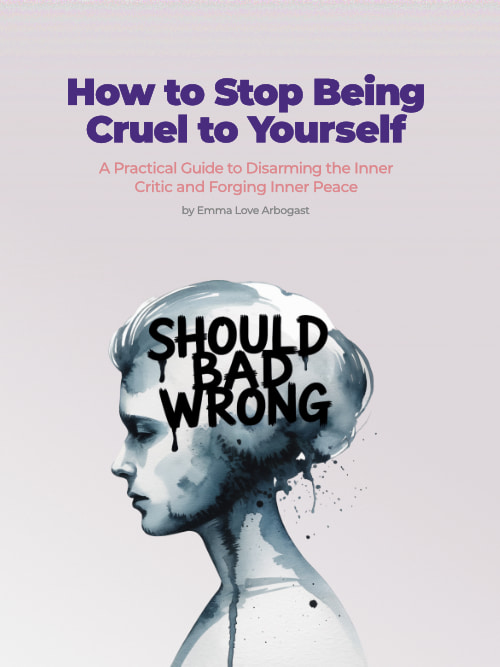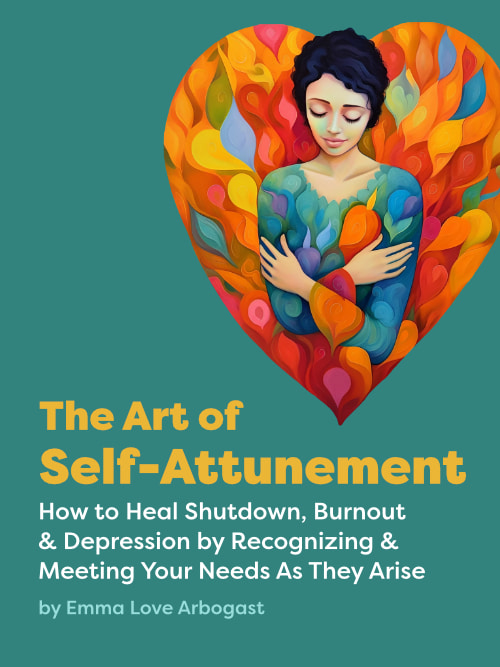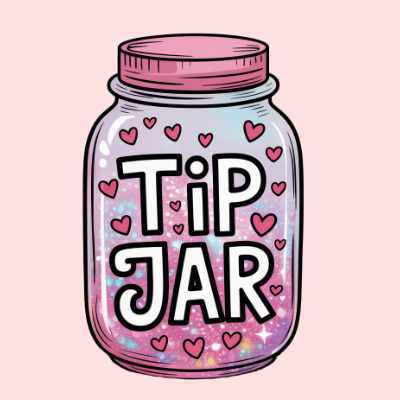Creative People: You Are Not Lazy
Creative people who get stuck in procrastination, avoidance, or general malaise often call themselves lazy. This is not accurate, and stops you from finding out what’s really going on.
Lazy is a label and judgment we put on behavior we don’t understand.
When I look back at times when I labelled myself ‘lazy’, what was really going on is that I was doing numbing activities – watching TV, playing computer games, futzing around doing things that were not ‘productive’ but were comforting. I wasn’t lazy—I was scared or in pain, and these activities stopped me from feeling it. I went for things that were comfortingly familiar and would fill the empty space. That’s not laziness—it’s a need for comfort and relief. It’s not wrong to want comfort.
My pain and fear came from believing stories about myself that were painful, like:
- I will never make anything meaningful of my life.
- I’m not living up to my potential.
- I’m not really good at anything.
- Life is pointless and meaningless.
“I’m lazy” is just another critical voice that doesn’t help.
It’s hard to do anything meaningful while enduring crushing self-criticism.
My “laziness symptoms” were just signposts about how much pain I was in. I needed to heal those voices, learn new ways to talk and be with myself, understand my needs, take care of myself, and find supportive community.
Over time, as I learned to translate those inner critical voices into information about what I needed to thrive, I stopped having to battle them. I started doing things like the Artist’s Way and other practices that promote a healthy relationship with creativity. And I deprogrammed myself from extrinsic motivation systems, and learned to deeply listen to and trust my intrinsic motivation.
After addressing these voices, my inspiration and motivation blossomed.
It turns out when I support myself be me, freely and fully, there are tons of projects I’m interested in doing and I have a lot of energy for them.
If the symptoms of “laziness” come up, I know it’s just information. It’s a signal that I’m needing comfort, and probably that means I’m in pain because of a story/belief that I’m telling myself, that isn’t serving me, or that I’m running on empty and need nurturing. It’s a signal about my needs. It doesn’t mean anything in itself. And when I take care of myself, and re-affirm what I know to be true, that I matter and my work matters, then I get back in touch with my creative essence and drive and want to make things.
I now know that if my life is going well, it’s a lot more interesting to me than TV and video games. I still use these to get through emotional upsets and grief–they are a way to help make my emotions temporarily more manageable–but they are not a substitute for making sure my life feeds me enough that I want to live it.
We are by nature creative beings full of excitement to contribute. We do not have to be pushed to do this–we just have to clear whatever is in the way of our natural energy coming through.
The analogy I use a lot is of a flower. You give it what it needs – nutrients, soil, sunlight, water, the right environment – and it thrives.
If you don’t give it what it needs – if any of those ingredients is missing – it wilts. Or it’s stunted from being undernourished.
We cannot thrive when our needs are not being met.
Humans need community, meaning, purpose, support, encouragement, appreciation, play…if we have these things, if we give ourselves these things, if our culture and community and family provide these things, then we thrive.
If we don’t have them, we wilt. We feel pain. And we develop habits to try to cope with that painful feeling of not having what we need. Habits that look like procrastination and laziness.
“Laziness” is just a pattern of behavior for coping with pain or lack of nourishment. The answer is to give yourself what you really need to thrive. If you only try to address the habits, with more structure and productivity systems, it might work in some ways, or for awhile. But if the truth is you need more of your underlying needs to be met, then that is what needs to be addressed.
Start with self-care.
Find small ways of taking care of yourself, being good to yourself, and supporting and encouraging yourself. Smile at yourself. Give yourself time and attention. Sit with the pain, writing it out, expressing it. Allow yourself comfort without self-recrimination.
Loving yourself is an active process, and if you aren’t used to it, you will need to practice it.
Procrastination can also be a sign that you just don’t want to do the thing or you don’t want to do it in the way you are telling yourself it has to be done. Sometimes it’s a signal that you want to say no and you aren’t letting yourself. Giving yourself permission to say no to what you don’t want is another form of self-care. Set boundaries that support you.
It is OK to need what you need and want what you want. Only by supporting the human vessel that is you can you be the channel for creativity that you want to be.
Figure out what your spirit needs to be happy. Do you need quiet, uninterrupted time? Periodic adventures in new places? To write every day? Track what makes you in particular feel satisfied and content and make it a regular part of your life.
You need other people, too.
Humans cannot thrive alone. And you absolutely cannot go against the tidal wave of life-denying culture by yourself. You need others who have life-affirming beliefs and practices. You need laughter and hugs and camaraderie and connection and shared reality and celebration.
This isn’t easy for many of us, and our rugged individualist culture doesn’t help. The first step is absolutely understanding and affirming that it’s not optional, and then actively seeking it, knowing and believing that others seek it too. I find being part of a group that meets weekly to be essential to my wellbeing.
Creativity is the natural byproduct of a healthy life.
There is no magic secret to being creative. And the common myth that you need to be tortured to be creative is just crap. It’s an artifact of the data; for every tortured-but-brilliant artist, there are dozens of tortured people whose tortured-ness stopped them from being creative at all, or stopped them from sharing their work with others. If being creative is part of what makes your spirit sing, then it will only be helped and enhanced by taking care of your human needs.
Self-love is a set of skills you can learn

Stop Being Cruel to Yourself
$2.99


Hey there! If you're new here, welcome to the Emmaverse! 🌈✨
About me: I'm autistic/ADHD and I write about how to be free and happy from the inside out.
Keep in touch?
Self-Liberation Society

Thank you for offering this definition. I like it, although I still resonate with being “fundamentally lazy.” I agree that my laziness undulates with waves of creativity, but it feels foundational. Always there. Ever present.
I love the kind and loving way you look upon and analyze the issues related to avoidance. It would not be painful if we were genuinely lazy. Issues around feeling nourishing support and community are basic. The problem is how to meet those needs if they are not being met. I think when those needs aren’t met, my energies are focused on meeting them. Thanks for a great piece.
Such wisdom here! Your advice gave me a level of cofidence I havent felt in years! Thank You VERY much!
Thanks for this timely article! Great site! And I love the name!
Thank you so much for this! I even emailed this to myself so I can work through this at a later time. I, as a creative person, have struggled with this for so many years, and it wasn’t until last year that I realized that I wasn’t being “lazy!”
You’re quite welcome!
this is such a great way to frame the state of mind called ‘laziness.’ I’ve started to learn this about myself, too, finally, and your article only boosts my hope.
I worked 5 days a week (like most folks) and felt like I had no time for anything but my ‘laziness.’ now my schedule has readjusted itself such that I have one, 8-hr ‘work’ day per week I can devote to working on my art. and it has been extremely helpful. I feel like I can stretch my wings and try to remember what it is I actually want to do with my life, and that it’s MY life and I own it!
Hello! I almost never comment on these (at no disrespdct to the authors!) but this article really hit home and I wanted to share that it did! I feel that I also have friends that would relate to it and so I’m glad it came up in my search.
Full Disclosure: my exact search query was “structure for lazy creatives” LMAO it knew I needed this wake up call!
Glad it helped!
This made my day! Thanks a ton!